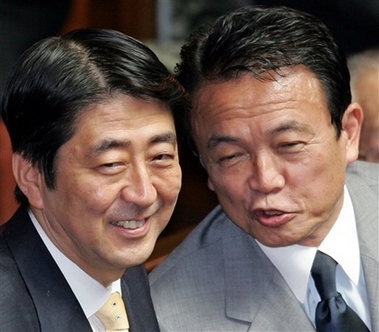TOKYO - New Japanese Prime Minister Shinzo Abe and South Korean President Roh
Moo-hyun agreed on Thursday to meet at an early date to improve strained ties, a
Japanese government spokesman said.

Japanese Prime Minister Shinzo Abe,
left, chats with Foreign Minister Taro Aso prior to the opening of a
Parliament session in Tokyo Thursday, Sept. 28, 2006. Abe, the new
outspoken nationalist prime minister, is soaring in public opinion polls
with support ratings for his Cabinet as high as 71 percent, according to
surveys released Thursday by four major newspapers.
[AP] |
But some analysts say the two Asian neighbours will not be able to restart
their leaders' shuttle diplomacy unless Abe clearly pledges not to visit a Tokyo
war shrine seen by Seoul as a symbol of Japan's past militarism.
Abe and Roh's agreement came in a 15-minute telephone conversation between
the two, Hiroshige Seko, Abe's special adviser in charge of public relations,
told a news conference.
"I would like to thoroughly talk with the president about developing
relations between Japan and South Korea in Northeast Asia and the world," Abe
told Roh, according to Seko. "I hope to meet you at an early date."
"I quite agree," Seko quoted Roh as telling Abe.
South Korea had shunned summits with Abe's predecessor, Junichiro Koizumi --
who stepped down this week -- over his pilgrimages to Tokyo's Yasukuni Shrine,
which honours Japanese wartime leaders convicted as war criminals along with war
dead.
Seoul's wording on the agreement suggested Roh might be in less of a hurry
than Abe to meet.
"The leaders of the two countries would meet at an appropriate time and
exchange views on promoting South Korea-Japan ties, and related matters would be
discussed through diplomatic channels," South Korea's presidential Blue House
said in a statement.
"Roh stressed that confidence and respect between South Korea and Japan are
of the utmost importance to the stable development of the two countries' ties,
and said he anticipated ties would develop and regional peace and cooperation
would strengthen on the occasion of Prime Minister Abe's inauguration," it said.
WAR SHRINE HAUNTS TIES
South Korea and China had objected strongly to Koizumi's annual visits to
Yasukuni Shrine.
Visits by Japanese leaders to the shrine stir bitter memories in China of
Japan's 1931-1945 invasion and occupation of large parts of the country, while
resentment still lingers in South Korea over Japan's often-brutal domination of
the Korean peninsula from 1910 to 1945.
"Unless Prime Minister Abe makes it clear that he will not visit Yasukuni,
there will be no exchanges of visits for summit meetings," said Yasuhiko
Yoshida, professor of international politics at the Osaka University of
Economics and Law.
Abe has backed Koizumi's visits to Yasukuni, but he has declined to say
whether he would visit the shrine as prime minister.
Japanese Foreign Minister Taro Aso said on Wednesday that Tokyo wants to hold
a leaders' meeting with China in October, and a visit to Beijing by Abe was one
option.
"As long as Abe keeps his stance on Yasukuni vague, he won't be able to
exchange visits with the South Korean and Chinese leaders," Yoshida said. "In
other words, Japan's relations with South Korea and China will not improve
easily."
He said Abe might meet with Roh and Chinese President Hu on the sidelines of
a November Asian Pacific leaders' gathering in Hanoi.
"But such meetings are different from real summit meetings based on shuttle
diplomacy."